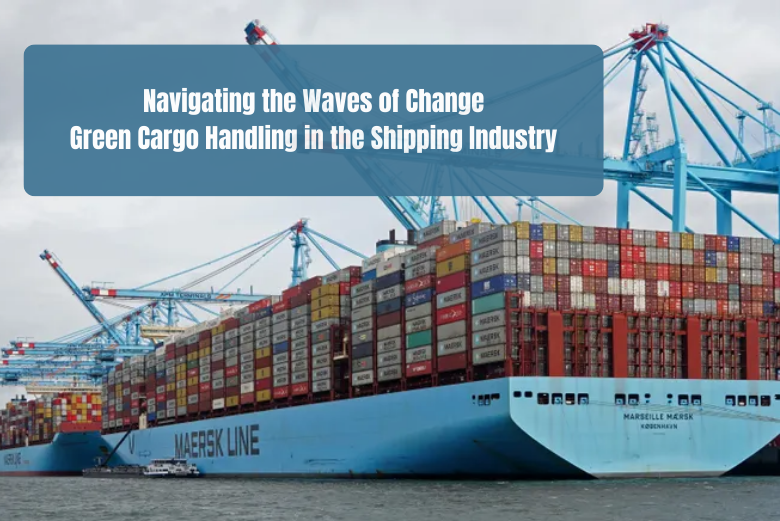Introduction:
In a world where environmental consciousness is paramount, industries are under increasing pressure to adopt sustainable practices. The shipping industry, a backbone of global trade, is no exception. One of the critical aspects being scrutinized is cargo handling, a process traditionally associated with significant environmental impact. This blog delves into the realm of green cargo handling, exploring sustainable practices that are reshaping the maritime landscape.
1. Eco-friendly Packaging:
The journey towards green cargo handling begins with a fundamental shift in the way goods are packaged. Companies are increasingly opting for eco-friendly packaging materials, reducing the environmental footprint of both the production and disposal phases. Biodegradable, recyclable, and reusable materials are gaining traction, providing a sustainable alternative to conventional packaging.
2. Efficient Port Operations:
Ports play a pivotal role in the shipping process, and their operations can significantly impact the environment. Green cargo handling emphasizes the need for efficient port operations to minimize waiting times, reduce idling, and optimize ship turnaround times. Implementing smart technologies, such as real-time tracking and predictive analytics, can enhance overall operational efficiency and contribute to a greener supply chain.
3. Shore Power and Cold Ironing:
Shipping vessels traditionally rely on their engines for power even when docked. Shore power, also known as cold ironing, offers a sustainable alternative. By connecting to the electrical grid of the port, vessels can switch off their engines, reducing emissions and noise pollution. This practice not only benefits the environment but also improves air quality in port areas, promoting healthier living conditions for nearby communities.
4. Renewable Energy Integration:
The integration of renewable energy sources is transforming the shipping industry. Solar panels, wind turbines, and even innovative technologies like kite sails are being employed to harness renewable energy and supplement traditional fuel sources. This not only reduces carbon emissions but also helps mitigate the industry’s dependence on non-renewable resources.
5. Smart Containerization:
The advent of smart container technology is revolutionizing cargo handling. These intelligent containers are equipped with sensors to monitor various parameters such as temperature, humidity, and location. By providing real-time data, smart containers enable better decision-making, optimize cargo space, and contribute to energy efficiency by minimizing the need for excessive climate control during transit.
6. Ballast Water Management:
Invasive species introduced through ballast water have been a long-standing environmental concern in the shipping industry. Green cargo handling involves implementing advanced ballast water treatment technologies to prevent the transfer of harmful organisms between different ecosystems. These technologies help safeguard marine biodiversity and maintain the ecological balance of water bodies.
7. Carbon Offsetting and Emission Reduction:
Shipping is a significant contributor to global carbon emissions. To mitigate this impact, companies are increasingly investing in carbon offsetting initiatives and adopting measures to reduce emissions. From slow steaming practices to the use of alternative fuels like liquefied natural gas (LNG), the industry is exploring diverse strategies to achieve greener and more sustainable transportation.
8. Digitalization and Block-chain for Transparency:
The digitalization of cargo documentation and the implementation of block-chain technology are contributing to more transparent and accountable supply chains. By creating secure, unchangeable records of every transaction and movement in the supply chain, these technologies enhance traceability and reduce the risk of fraud. Transparent supply chains are crucial for verifying sustainable practices, ensuring that environmentally friendly cargo handling is maintained throughout the entire journey.
9. Collaboration and Industry Standards:
The transition to green cargo handling requires collaborative efforts across the industry. Shipping companies, port authorities, and logistics partners are increasingly collaborating to set and adhere to common sustainability standards. These standards encompass everything from vessel design and fuel efficiency to waste management practices. By establishing shared goals and best practices, the industry can work collectively to achieve a more sustainable and environmentally friendly supply chain.
10. Training and Awareness Programs:
To successfully implement green cargo handling practices, it is crucial to invest in training programs for industry professionals. From ship crews to port workers, educating individuals about the importance of sustainability and providing them with the skills to implement green practices is essential. Awareness programs also extend to shippers and consumers, fostering a collective responsibility for the environmental impact of the goods being transported.
11. Circular Economy Practices:
Green cargo handling extends beyond the shipping process to embrace the principles of a circular economy. This involves minimizing waste generation, promoting recycling, and reusing materials whenever possible. By adopting circular economy practices, the shipping industry can contribute to a more sustainable and resource-efficient global economy.
12. Government Regulations and Incentives:
Governmental bodies worldwide are recognizing the need to regulate and incentivizes sustainable practices in the shipping industry. Regulations that enforce emission standards, promote the use of cleaner fuels, and penalize environmentally harmful practices are becoming more prevalent. Additionally, governments are offering financial incentives to companies adopting green technologies and practices, further encouraging the transition to sustainable cargo handling.
Conclusion:
In the face of growing environmental concerns, the shipping industry is undergoing a profound transformation towards green cargo handling. From rethinking packaging materials to harnessing renewable energy, the adoption of sustainable practices is reshaping the industry’s impact on the planet. The journey towards environmentally friendly cargo handling involves a multifaceted approach, encompassing technological innovation, collaboration, education, and regulatory measures. As the industry continues to evolve, the commitment to sustainability will be a driving force, steering the shipping sector towards a more responsible and resilient future.



